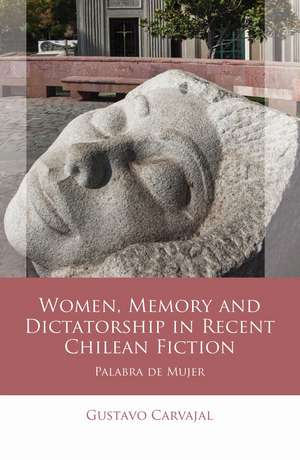Women, Memory and Dictatorship in Recent Chilean Fiction: Palabra de Mujer: Iberian and Latin American Studies
Autor Gustavo Carvajalen Limba Engleză Hardback – 18 feb 2022
How do the politics of memory perpetuate gendered images of political violence in Chile? Can the literary rewriting of painful experiences contest existing interpretations of national trauma? How do women participate in the production of collective narratives of the past in the aftermath of violence? This book discusses the literary representation of women and their memory practices in the recent work of seven contemporary Chilean authors: Diamela Eltit, Carlos Franz, Pía González, Fátima Sime, Arturo Fontaine, Pía Barros, and Nona Fernández. It locates their works in the context of a patriarchal politics of memory in Chile, a country still grappling with the legacy of military dictatorship. Through the analysis of novels that depict the dictatorial past through the memories of women, Gustavo Carvajal argues that these texts explore remembrance as a process by which the patriarchal co-option of women’s memories can be exposed and even contested in the aftermath of violence.
Din seria Iberian and Latin American Studies
- 8%
 Preț: 459.38 lei
Preț: 459.38 lei - 11%
 Preț: 546.62 lei
Preț: 546.62 lei - 11%
 Preț: 508.34 lei
Preț: 508.34 lei - 8%
 Preț: 564.74 lei
Preț: 564.74 lei - 8%
 Preț: 494.04 lei
Preț: 494.04 lei - 8%
 Preț: 528.39 lei
Preț: 528.39 lei - 8%
 Preț: 529.24 lei
Preț: 529.24 lei - 8%
 Preț: 529.24 lei
Preț: 529.24 lei - 15%
 Preț: 549.27 lei
Preț: 549.27 lei - 15%
 Preț: 549.03 lei
Preț: 549.03 lei - 8%
 Preț: 529.81 lei
Preț: 529.81 lei - 8%
 Preț: 377.45 lei
Preț: 377.45 lei - 15%
 Preț: 482.94 lei
Preț: 482.94 lei - 13%
 Preț: 340.85 lei
Preț: 340.85 lei - 8%
 Preț: 339.28 lei
Preț: 339.28 lei -
 Preț: 143.82 lei
Preț: 143.82 lei -
 Preț: 340.37 lei
Preț: 340.37 lei -
 Preț: 341.94 lei
Preț: 341.94 lei - 15%
 Preț: 452.10 lei
Preț: 452.10 lei - 8%
 Preț: 459.91 lei
Preț: 459.91 lei - 15%
 Preț: 549.03 lei
Preț: 549.03 lei
Preț: 415.60 lei
Preț vechi: 461.62 lei
-10% Nou
Puncte Express: 623
Preț estimativ în valută:
79.53€ • 86.36$ • 66.81£
79.53€ • 86.36$ • 66.81£
Carte nepublicată încă
Doresc să fiu notificat când acest titlu va fi disponibil:
Se trimite...
Preluare comenzi: 021 569.72.76
Specificații
ISBN-13: 9781786838032
ISBN-10: 1786838036
Pagini: 240
Dimensiuni: 140 x 216 x 25 mm
Greutate: 0.4 kg
Editura: University of Wales Press
Colecția University of Wales Press
Seria Iberian and Latin American Studies
ISBN-10: 1786838036
Pagini: 240
Dimensiuni: 140 x 216 x 25 mm
Greutate: 0.4 kg
Editura: University of Wales Press
Colecția University of Wales Press
Seria Iberian and Latin American Studies
Notă biografică
Gustavo Carvajal is a lecturer in Hispanic literature at the Universidad Finis Terrae in Chile.
Cuprins
Contents
Acknowledgments
Introduction
Patriarchy and memory
Remembering dictatorial Chile
Women’s memories in the public sphere
Chileans fictions of the traumatic past
1 Violence and women’s memories in El Desierto
Rituals of violence and memory
Understanding the traumatic past
Victims and perpetrators
2 Militants, wives and mothers in Jamás el Fuego Nunca and Libreta de Familia 77
The Chilean novel, the dictatorship and the Left
The gendered construction of militants and wives
The gendered construction of a mother
3 Female collaboration in Carne de Perra and La Vida Doble
The Bachelet government
Confessions and conversions
Collaborators in democracy
Telling stories
4 Daughters rewriting legacies in ‘El lugar del otro’ and Fuenzalida
Inherited memories
Family albums
Daughters of the dictatorship
Rewriting legacies
Conclusion
Notes
Bibliography
Acknowledgments
Introduction
Patriarchy and memory
Remembering dictatorial Chile
Women’s memories in the public sphere
Chileans fictions of the traumatic past
1 Violence and women’s memories in El Desierto
Rituals of violence and memory
Understanding the traumatic past
Victims and perpetrators
2 Militants, wives and mothers in Jamás el Fuego Nunca and Libreta de Familia 77
The Chilean novel, the dictatorship and the Left
The gendered construction of militants and wives
The gendered construction of a mother
3 Female collaboration in Carne de Perra and La Vida Doble
The Bachelet government
Confessions and conversions
Collaborators in democracy
Telling stories
4 Daughters rewriting legacies in ‘El lugar del otro’ and Fuenzalida
Inherited memories
Family albums
Daughters of the dictatorship
Rewriting legacies
Conclusion
Notes
Bibliography
Recenzii
Drawing on an impressive selection of texts that offer insight into the gendered nature of memory politics in post-dictatorship Chile, Palabra de Mujer explores and challenges the boundaries between dictatorship and post-dictatorship, fact and fiction, perpetrator and victim, offering a nuanced portrayal of the ways in which literary voices engage with the past.
-Cara Levey, University College Cork, Ireland
-Cara Levey, University College Cork, Ireland
A powerful exploration of the gendered dimensions of subjugation and the many ways such violence has been rendered visible through literature. By bringing together post-dictatorial Chilean fiction, feminist theory and historical analysis, Carvajal prompts us to think in new ways about patriarchal control, militaristic culture, and how writing can become a tool of dissent.
-Lisa Renee DiGiovanni, Keene State College, New Hampshire
-Lisa Renee DiGiovanni, Keene State College, New Hampshire
